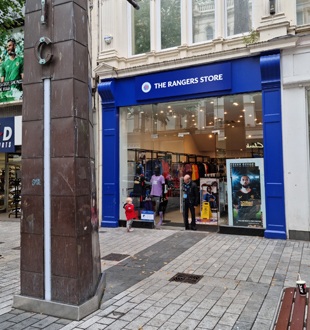In the September and October print editions of Professional Security magazine we look at the most significant change in private security in our time, hired officers at work in public space. Covid meant only a break in this shift in how our town and city spaces are policed, writes Mark Rowe.
That security officers guard private and semi-public space is so taken for granted that we could take anywhere as an example. As Professional Security was in Belfast for the ST21 event in early September, let’s take that city: a Sword Security officer in a hi-vis sleeveless jacket was walking around Europa Bus Centre on a weekday afternoon while school children were taking buses home; in each of the jewellery shops of Queen’s Arcade, you could see through the door a guard in black suit. Across the road at the Rangers FC store, a Bidvest Noonan officer was at the door (pictured), facing outwards, at once practical – checking who or what trouble might be coming their way – and symbolic: with the (recent) encouragement of police, such guards thereby ‘own’ the public space outside the shop, giving authority extra pairs of eyes and ears. The same goes, by night, for door staff at pubs.
This outward-facingness (if that is a word) dates only from the last few years, when police ever more stretched began to encourage security guard forces to view the public space in front of their buildings – notably such landmarks as the National Gallery in London. Previously, police were jealous of their monopoly of public policing, and sought to keep it that way. Whether the change is that private security guards are now SIA-badged and trustworthy, or the terror threat in cities, or police are short of bodies to provide visible policing – so important in terms of public reassurance, regardless of how useful it is for detecting crime – it’s an important one. Protocols for how those public patrollers work have yet to catch up, and the public has yet to twig. For this profound change in who polices the streets has not been subject to any political debate, for all the utility of crime and law and order as a party political issue.
Since the mid-2000s, Britain has had a CSAS (community safety accreditation scheme), that BIDs and others can require their contract firms to join, to have some police-like powers, such as the power to issue fines for littering or on-street drinking. Or not, if the BID chooses not to go down that sanctions route.
BIDs hire
That private guards in effect police semi-public space like Queen’s Arcade in Belfast, or other arcades or a shopping mall is uncontroversial, and there’s nothing new under the sun: Queen’s Arcade, and Burlington Arcade in London’s Mayfair, date from the 19th century. What’s new is that local government and above all business improvement districts (BIDs) are hiring contract security to walk and thereby mimic beat policing, that police have in the main long given up.
In the September edition, we ended our look at this development in guarding with the thought that police are largely confined to 999 response in cars and vans, the crime equivalent of fire-fighters. Police get to keep out of the cold or heat and have opportunities to take it easy that stewards and SIA-badged security officers, on duty in sight of crowds at a main line station for example do not.
More in the October print edition, ‘The direction of travel‘.










